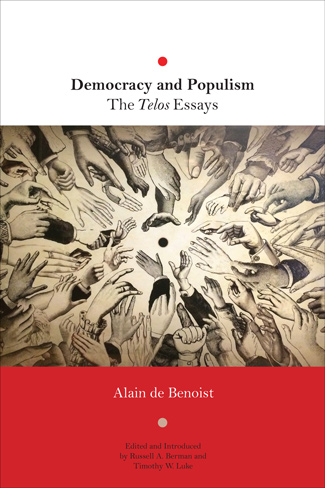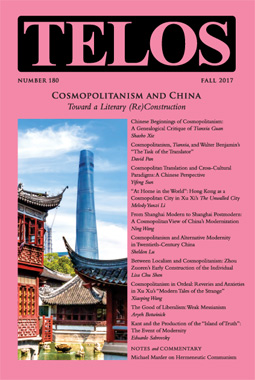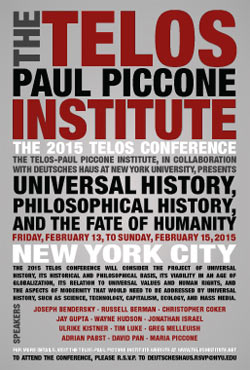By Telos Press · Saturday, September 1, 2018 New from Telos Press: Democracy and Populism: The Telos Essays, by Alain de Benoist. Edited by Russell A. Berman and Timothy W. Luke. Order your copy in our online store, and save 20% on the list price by using the coupon code BOOKS20 during the checkout process.
 The crisis of democracy, the consequences of neoliberalism and globalization, the limits of sovereignty, and of course the rise of populism: few thinkers have given more sustained attention to these matters than the French author Alain de Benoist. Democracy and Populism collects de Benoist’s essays from the journal Telos, where many of his writings first appeared in English translation. Reading de Benoist in Telos provides access to a distinctive transatlantic intellectual dialogue and to an array of prescient insights into the current political condition on both continents. De Benoist clearly anticipated today’s political condition: the critique of neoliberalism, the contradictions in liberalism created by the postcolonial frictions of identity politics, and the implications of a resurgent populism. The specific forms of populist movements are sure to vary in the coming years, but the crisis of liberal democracy will remain the defining feature of political life for the foreseeable future. De Benoist explains why. The crisis of democracy, the consequences of neoliberalism and globalization, the limits of sovereignty, and of course the rise of populism: few thinkers have given more sustained attention to these matters than the French author Alain de Benoist. Democracy and Populism collects de Benoist’s essays from the journal Telos, where many of his writings first appeared in English translation. Reading de Benoist in Telos provides access to a distinctive transatlantic intellectual dialogue and to an array of prescient insights into the current political condition on both continents. De Benoist clearly anticipated today’s political condition: the critique of neoliberalism, the contradictions in liberalism created by the postcolonial frictions of identity politics, and the implications of a resurgent populism. The specific forms of populist movements are sure to vary in the coming years, but the crisis of liberal democracy will remain the defining feature of political life for the foreseeable future. De Benoist explains why.
Continue reading →
By Yifeng Sun · Wednesday, November 1, 2017 Yifeng Sun’s “Cosmopolitan Translation and Cross-Cultural Paradigms: A Chinese Perspective” appears in Telos 180 (Fall 2017), a special issue on Cosmopolitanism and China. Read the full article at the Telos Online website, or purchase a print copy of the issue in our online store. Individual subscriptions to Telos are now available in both print and online formats.
This paper proposes to investigate the shifting cross-cultural paradigms in response to cosmopolitan thinking and consciousness as well as the nature of cultural translation in relation to cosmopolitanism. The perception of cosmopolitan translation, referring primarily to cultural translation situated fully within the cosmopolitan constellation, is closely linked to cognitive, social, and cultural change in a global and globalizing context. The rapid development of globalization raises questions about nationalism, cultural identity, and, above all, translation itself.
Continue reading →
By Richard Sakwa · Friday, September 22, 2017 The following paper was presented at the conference “After the End of Revolution: Constitutional Order amid the Crisis of Democracy,” co-organized by the Telos-Paul Piccone Institute and the National Research University Higher School of Economics, September 1–2, 2017, Moscow. For additional details about the conference as well as other upcoming events, please visit the Telos-Paul Piccone Institute website.
Russia will have many futures because it has had many pasts. Three aspects in particular stand out in any discussion of Russia’s future. The first is what Marxists used to call the “present political conjuncture.” In other words, the fate of Russia is inextricably linked with the broader developments in global political practices. It is within this framework that one needs to consider the “post-revolutionary” character of Russia. Mikhail Gorbachev’s perestroika (restructuring) began in 1985 soon after his accession to the Soviet leadership, but the great ebb tide of emancipatory socialism had begun long before. The post-war Keynesian and welfare state consensus had already begun to unravel with the end of the long post-war economic boom in 1970 and the move to flexible exchange rates in August 1971 as Richard Nixon moved away from the Bretton Woods system of pegging the dollar to gold. The 1970s saw the first moves toward financial liberalization, and Margaret Thatcher’s election in May 1979 signaled, as Eric Hobsbawm put it in September 1978 in a famous article in Marxism Today, that the “Forward March of Labour” was halted. The election of Ronald Reagan in November 1980 further indicated the beginning of an offensive against the ideology and geopolitics of revolutionary socialism. In its place the gathering wave of the neoliberal transformation of capitalism transformed the relationship of state to society, the character of work, and the understanding of citizenship in advanced capitalist societies.
Continue reading →
By Ning Wang · Wednesday, September 13, 2017 Telos 180 (Fall 2017) is now available for purchase in our store.
 In Western as well as international academia today, along with the acceleration of globalization more generally, humanities scholars have constructed a sort of theoretical discourse of globalization. In doing so, they have found it useful to refer to the old-fashioned philosophical concept of cosmopolitanism, which is very close to the theoretical construction of the discourse of globalization. Although it has previously been discussed over the history of Western philosophy, cosmopolitanism is once again a cutting-edge theoretical topic. The term nowadays frequently appears in the works of political philosophers and sociologists, and it is increasingly being taken up and debated by literary and cultural studies scholars as well, particularly with regard to the rise of world literature as the highest phase of comparative literature. Obviously, most of their work interprets and deals with cosmopolitanism from the perspectives of political philosophy and culture, while touching to some degree upon literary and cultural production and criticism. Moreover, most of the scholarship dealing with cosmopolitanism only occurs within a Western context. In this respect, the present special issue of Telos may well fill a gap in international cosmopolitanism scholarship. The recent interest in world literature in the field of comparative literature is undoubtedly associated with the rise of cosmopolitanism in the contemporary era. In the articles collected here, cosmopolitanism will mainly be addressed from literary and cultural perspectives, and, more importantly, they will move beyond the limits of Eurocentric or West-centric ways of thinking and modes of research by dealing exclusively with cosmopolitanism and China: its parallel relations with ancient Chinese philosophy, its impact on modern Chinese literature and intellectual thought, and its recent significance to China’s modernization and globalization. In Western as well as international academia today, along with the acceleration of globalization more generally, humanities scholars have constructed a sort of theoretical discourse of globalization. In doing so, they have found it useful to refer to the old-fashioned philosophical concept of cosmopolitanism, which is very close to the theoretical construction of the discourse of globalization. Although it has previously been discussed over the history of Western philosophy, cosmopolitanism is once again a cutting-edge theoretical topic. The term nowadays frequently appears in the works of political philosophers and sociologists, and it is increasingly being taken up and debated by literary and cultural studies scholars as well, particularly with regard to the rise of world literature as the highest phase of comparative literature. Obviously, most of their work interprets and deals with cosmopolitanism from the perspectives of political philosophy and culture, while touching to some degree upon literary and cultural production and criticism. Moreover, most of the scholarship dealing with cosmopolitanism only occurs within a Western context. In this respect, the present special issue of Telos may well fill a gap in international cosmopolitanism scholarship. The recent interest in world literature in the field of comparative literature is undoubtedly associated with the rise of cosmopolitanism in the contemporary era. In the articles collected here, cosmopolitanism will mainly be addressed from literary and cultural perspectives, and, more importantly, they will move beyond the limits of Eurocentric or West-centric ways of thinking and modes of research by dealing exclusively with cosmopolitanism and China: its parallel relations with ancient Chinese philosophy, its impact on modern Chinese literature and intellectual thought, and its recent significance to China’s modernization and globalization.
Continue reading →
By Pierre-André Taguieff · Saturday, June 25, 2016 Today, the anti-elitist political concept responds directly and effectively to social demands in Europe and the United States. And this anti-elitist or anti-system concept perfectly encompasses both the left and right, and, of course, the extremists. As different as they are, the new leaders are protesting and transgressive. Their demagoguery is marked by the language of transgression, provocation, and excess, based on the subversion of language or behavior codes: for them, this is a matter of drawing a clear distinction from the standard model policy. They can complain about being demonized by their opponents, while still trying to stay slightly demonized in order to maintain their attractiveness. This is the prerequisite to the seduction that they perform. This differentiates them from formatted and conformist leaders, who pursue respectability, which makes them somewhat watery.
Continue reading →
By Tsutomu Ben Yagi · Wednesday, April 1, 2015  The aim of this short paper is to offer a critical response to Philippe Van Parijs concerning his notion of linguistic justice as worked out most extensively in his book Linguistic Justice for Europe and for the World (2011). I thus begin by elucidating his conception of linguistic justice by presenting two basic theses on which it rests: first, he attempts to demonstrate the need for a lingua franca in the “globalized” (or rather “globalizing”) world today (i.e., advocating a common language for the entire world); and second, he seeks to justify the exceptional and unprecedented position the English language is now in to serve as the de facto lingua franca for this globalizing world. Given the general theme of history for this conference, I shall present Van Parijs’ thoughts with a particular focus on its historical aspects and implications. Accordingly, the first part of my discussion will center on the idea of lingua franca in relation to history. As a critical response to Van Parijs’ view, I subsequently take up the question of translation and discuss in the second part the significant role translation can and must play in our contemporary, multilingual world. Such an analysis will be carried out by examining some of the important contributions made in the hermeneutic tradition on the question of translation. In particular, the works of George Steiner, John Sallis, and Paul Ricoeur will be considered. By doing so, I wish to demonstrate in this paper that it is not English as the lingua franca that serves linguistic justice, but rather our openness to translation that must be seen as a fundamental principle of linguistic justice. The aim of this short paper is to offer a critical response to Philippe Van Parijs concerning his notion of linguistic justice as worked out most extensively in his book Linguistic Justice for Europe and for the World (2011). I thus begin by elucidating his conception of linguistic justice by presenting two basic theses on which it rests: first, he attempts to demonstrate the need for a lingua franca in the “globalized” (or rather “globalizing”) world today (i.e., advocating a common language for the entire world); and second, he seeks to justify the exceptional and unprecedented position the English language is now in to serve as the de facto lingua franca for this globalizing world. Given the general theme of history for this conference, I shall present Van Parijs’ thoughts with a particular focus on its historical aspects and implications. Accordingly, the first part of my discussion will center on the idea of lingua franca in relation to history. As a critical response to Van Parijs’ view, I subsequently take up the question of translation and discuss in the second part the significant role translation can and must play in our contemporary, multilingual world. Such an analysis will be carried out by examining some of the important contributions made in the hermeneutic tradition on the question of translation. In particular, the works of George Steiner, John Sallis, and Paul Ricoeur will be considered. By doing so, I wish to demonstrate in this paper that it is not English as the lingua franca that serves linguistic justice, but rather our openness to translation that must be seen as a fundamental principle of linguistic justice.
Continue reading →
|
|
 The crisis of democracy, the consequences of neoliberalism and globalization, the limits of sovereignty, and of course the rise of populism: few thinkers have given more sustained attention to these matters than the French author Alain de Benoist. Democracy and Populism collects de Benoist’s essays from the journal Telos, where many of his writings first appeared in English translation. Reading de Benoist in Telos provides access to a distinctive transatlantic intellectual dialogue and to an array of prescient insights into the current political condition on both continents. De Benoist clearly anticipated today’s political condition: the critique of neoliberalism, the contradictions in liberalism created by the postcolonial frictions of identity politics, and the implications of a resurgent populism. The specific forms of populist movements are sure to vary in the coming years, but the crisis of liberal democracy will remain the defining feature of political life for the foreseeable future. De Benoist explains why.
The crisis of democracy, the consequences of neoliberalism and globalization, the limits of sovereignty, and of course the rise of populism: few thinkers have given more sustained attention to these matters than the French author Alain de Benoist. Democracy and Populism collects de Benoist’s essays from the journal Telos, where many of his writings first appeared in English translation. Reading de Benoist in Telos provides access to a distinctive transatlantic intellectual dialogue and to an array of prescient insights into the current political condition on both continents. De Benoist clearly anticipated today’s political condition: the critique of neoliberalism, the contradictions in liberalism created by the postcolonial frictions of identity politics, and the implications of a resurgent populism. The specific forms of populist movements are sure to vary in the coming years, but the crisis of liberal democracy will remain the defining feature of political life for the foreseeable future. De Benoist explains why. 
 The aim of this short paper is to offer a critical response to Philippe Van Parijs concerning his notion of linguistic justice as worked out most extensively in his book Linguistic Justice for Europe and for the World (2011). I thus begin by elucidating his conception of linguistic justice by presenting two basic theses on which it rests: first, he attempts to demonstrate the need for a lingua franca in the “globalized” (or rather “globalizing”) world today (i.e., advocating a common language for the entire world); and second, he seeks to justify the exceptional and unprecedented position the English language is now in to serve as the de facto lingua franca for this globalizing world. Given the general theme of history for this conference, I shall present Van Parijs’ thoughts with a particular focus on its historical aspects and implications. Accordingly, the first part of my discussion will center on the idea of lingua franca in relation to history. As a critical response to Van Parijs’ view, I subsequently take up the question of translation and discuss in the second part the significant role translation can and must play in our contemporary, multilingual world. Such an analysis will be carried out by examining some of the important contributions made in the hermeneutic tradition on the question of translation. In particular, the works of George Steiner, John Sallis, and Paul Ricoeur will be considered. By doing so, I wish to demonstrate in this paper that it is not English as the lingua franca that serves linguistic justice, but rather our openness to translation that must be seen as a fundamental principle of linguistic justice.
The aim of this short paper is to offer a critical response to Philippe Van Parijs concerning his notion of linguistic justice as worked out most extensively in his book Linguistic Justice for Europe and for the World (2011). I thus begin by elucidating his conception of linguistic justice by presenting two basic theses on which it rests: first, he attempts to demonstrate the need for a lingua franca in the “globalized” (or rather “globalizing”) world today (i.e., advocating a common language for the entire world); and second, he seeks to justify the exceptional and unprecedented position the English language is now in to serve as the de facto lingua franca for this globalizing world. Given the general theme of history for this conference, I shall present Van Parijs’ thoughts with a particular focus on its historical aspects and implications. Accordingly, the first part of my discussion will center on the idea of lingua franca in relation to history. As a critical response to Van Parijs’ view, I subsequently take up the question of translation and discuss in the second part the significant role translation can and must play in our contemporary, multilingual world. Such an analysis will be carried out by examining some of the important contributions made in the hermeneutic tradition on the question of translation. In particular, the works of George Steiner, John Sallis, and Paul Ricoeur will be considered. By doing so, I wish to demonstrate in this paper that it is not English as the lingua franca that serves linguistic justice, but rather our openness to translation that must be seen as a fundamental principle of linguistic justice. 

